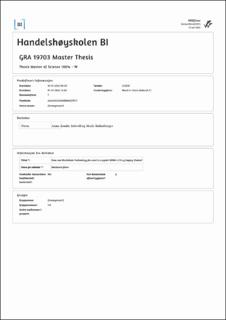| dc.contributor.author | Julsvoll, Anna Amalie | |
| dc.contributor.author | Sickenberger, Marla | |
| dc.date.accessioned | 2022-12-12T14:03:46Z | |
| dc.date.available | 2022-12-12T14:03:46Z | |
| dc.date.issued | 2022 | |
| dc.identifier.uri | https://hdl.handle.net/11250/3037318 | |
| dc.description | Masteroppgave(MSc) in Master of Science in Business, Logistics, operations and supply chain management - Handelshøyskolen BI, 2022 | en_US |
| dc.description.abstract | Drug shortages and drug counterfeiting continue to pose a severe threat to human health, both in low-income and high-income countries. Supply chain risk management is becoming more important in the fight against these two issues. New emerging technologies, such as blockchain technology, might offer new methods and tools to support supply chain risk management in that task. The use of blockchain technology in supply chain risk management is new, but also field with limited academic literature. Subsequently, the purpose of this master thesis was to explore how blockchain technology may support supply chain risk management in drug supply chains. Thus, the research objective of this study was to; (i) provide insights into how (practically) blockchain technology can be used to support supply chain risk management in drug supply chains, (ii) assess the value of using a blockchain in drug supply chains for supply chain risk management, and (iii) identify blockchain implementation barriers in drug supply chains. | en_US |
| dc.language.iso | eng | en_US |
| dc.publisher | Handelshøyskolen BI | en_US |
| dc.subject | logistics supply chain management logistikk forsyningskjeder ledelse | en_US |
| dc.title | How can Blockchain Technology be used to support Supply Chain Risk Management in Drug Supply Chains? | en_US |
| dc.type | Master thesis | en_US |
